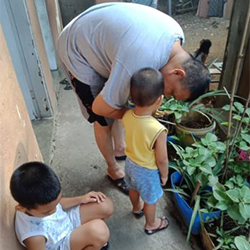
Philippines pastoral family uses garden to disciple children during COVID-19

In the Philippines, the COVID-19 pandemic lockdown began in mid-March. That lockdown is still in effect for children, as no one under 20 years old is allowed to leave their homes unless it is an emergency. Michelle Cainglet, whose husband, Pedrito, pastors Dalisay Church of the Nazarene just outside of Manila, tells how her family is creating learning spaces for their children, even in lockdown.
Just outside our rented room, we have a vegetable garden that my husband made. Our goal was to satisfy our sons’ curiosity and to give them a chance to hold, feel, and rub the soil in their hands. Since we live in the city, we wanted to teach them how to value life and let them see how plants grow, flower, harvest, and die.
We wanted to show our children how insects interact with the plants, how the torrential rains can destroy the leaves and erode the soil, and how the heat of the sun is also a factor that causes the soil to dry up and the roots of the plants to sip the water. We love showing them farm life like we experienced as kids growing up in the countryside.
Petros Moriah, our eldest son, is 9 years old, and his eyes and hands are always on the go to find new things in the garden. He is always the first one to find a budding flower. When I am in the kitchen preparing meals, he stands beside me to either lecture me about what he has read or to ask me how and why a certain veggie is the way it is. Once he asked me how vegetables grow. I told him that it all started with a seed. And now, every time I prepare vegetables with seeds, he gathers them and dries them. After two days, he finds space in our pots to plant them in the soil.
We are teaching the children many lessons through our time in the garden. When they discover something new, it stirs up excitement in their hearts. For instance, we showed them how the ampalaya vine climbs up the rope. I told them that this is how we should hold on to God, hold on to His promises, and hold on to each other, so we won’t fall but thrive and live in God’s way.
The children received another lesson when we buried some rotten chiles in a pot, covering them with soil to make them into organic fertilizer. A few days later, they sprouted and we were amazed to see them grow. I said, “We may be rotten and useless outside, but if we have God’s life inside, even though we are buried in the mud, we will grow in God’s time.”
When five worms showed up and started devouring leaves, Petros saw this and he was jumping up and down in fear because they might eat all the leaves and the plant would die. I had to remind him about what he had learned from science: that there is a cycle of life and a food chain in nature.
One of the things I admire about Petros is how he loves to read. He loves informative and historical books and books with lots of pictures in them. Science is his favorite subject. On YouTube, he searches for the smallest, biggest, or weirdest animal or plant on earth. That’s where his love for our garden is being fueled, in his mind.
Uncertainties are still in front of us. But this pandemic has taught us as a family to care, to observe, and to do something valuable. We do it together with scrutinizing eyes and hearts open to learning. We as parents have only one prayer for our sons, that they would grow up following Jesus and become a blessing to many. May our vegetable garden be an avenue for them to view the world through God’s eyes!

